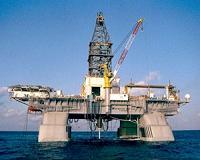 |
Algiers, Algeria (UPI) Sep 9, 2010 The Algerian Energy Ministry plans to take bids on new oil exploration licenses this year, but the auction has already been postponed once because the state-owned oil company Sonatrach is being investigated by the intelligence service in a political power struggle. The number and location of the blocks being put on sale hasn't been disclosed. But ministry sources say that some 70 companies were qualified to bid in the auction that was postponed by Sonatrach, a powerful state monopoly and a pillar of Algeria's economy. Africa Energy Intelligence, a Paris Web site that monitors the continent's energy industry, said these include Exxon Mobil of the United States, Royal Dutch Shell, Total of France, BP, ENI of Italy, Gazprom of Russia and Repsol of Spain. Algeria is one of the major oil and gas producers in Africa but it is still considered relatively under-explored. The country, wracked for most of the 1990s by an Islamist insurgency in which an estimated 100,000 people died, has proven oil reserves of 12.27 billion barrels as well as natural gas reserves of 4.51 trillion cubic meters. Oil production is currently pegged at around 2.13 million barrels per day, making it the No. 4 African producer after Angola, Nigeria and Libya. Algeria provides 15 percent of Europe's gas. Sonatrach, which is responsible for upstream and downstream oil and gas industries, has been at the center of a major anti-corruption campaign launched by the government in January amid allegations of irregularities in awarding contracts. The national intelligence service, known as the DRS and controlled by the Defense Ministry, headed the investigation. All foreign companies working in OPEC-member Algeria are required by law to set up joint ventures with Sonatrach, which accounts for 98 percent of Algeria's currency receipts. There have been several corruption probes in recent years but these have been overwhelmingly political and generally involve rival power centers and clans within the ruling elite to settle scores or increase their clout. Suspicions of corruption have swirled around the state oil giant for some time. The government established a special anti-corruption agency Aug. 25 that will be under the Interior Ministry. Sonatrach has been seriously crippled by the actions of Algeria's military chiefs who have been feuding with President Abdelaziz Bouteflika. DRS Director Mohammed "Tewfik" Mediene has been crossing swords with Bouteflika for years. The 73-year-old president has sought to curb the intelligence chief's authority and to overhaul the security services and the national police to act as a counterweight against the military that until a few years held undisputed power in Algeria. Several top figures at Sonatrach have been toppled since January. Most of them are political allies of Bouteflika, who has been striving to strengthen the presidency. The most prominent are Chief Executive Officer Mohamed Meziane and his top managers, who were all linked to Bouteflika. The purge "is almost on a disastrous scale," said Samuel Ciszuk, Middle East energy analyst with IHS Global Insight of London. "It would seem the company's been decapitated." Meziane, arrested in January, has been indicted for embezzlement. He and his two sons, along with former Sonatrach Vice Presidents Belkacem Boumediene and Benamar Zenasni, are all behind bars. The arrests have undermined Energy Minister Chakib Khelil, a close Bouteflika ally who appointed Meziane several years ago. Another target is Transport Minister Amar Ghoul, who, like Khelil, has been in all Boutelfika's Cabinets since he was elected president in April 1999. The new managers at Sonatrach are all seen as opponents of Khelil. The investigations and arrests have paralyzed decision-making in the energy industry at a time when gas production is declining and a drop in gas prices has hit Algeria financially. Africa Energy Intelligence reported Aug. 31 that a government report said domestic gas consumption was rising but production wasn't. That meant less gas was available for export. "That puts Algiers in a difficult position as the country's gas output has remained stationary for the past 10 years while new projects for gas pipelines to Europe have multiplied," the site noted. It observed that "the appointment of executives who are less beholden to the Energy Ministry threatens to prolong or even worsen the paralysis despite the fact Sonatrach has a number of urgent problems to resolve."
Share This Article With Planet Earth
Related Links Powering The World in the 21st Century at Energy-Daily.com
 Battle of oil titans as BP seeks to shift blame for spill
Battle of oil titans as BP seeks to shift blame for spillChicago (AFP) Sept 8, 2010 BP sought to spread the blame for the Gulf of Mexico oil disaster Wednesday, setting off a battle of oil industry giants with tens of billions of dollars in potential fines and legal liabilities at stake. The British energy giant released a report concluding that a "sequence of failures" were to blame for the April 20 explosion that killed 11 people and unleashed 4.9 million barrels of oil i ... read more |
|
| The content herein, unless otherwise known to be public domain, are Copyright 1995-2010 - SpaceDaily. AFP and UPI Wire Stories are copyright Agence France-Presse and United Press International. ESA Portal Reports are copyright European Space Agency. All NASA sourced material is public domain. Additional copyrights may apply in whole or part to other bona fide parties. Advertising does not imply endorsement,agreement or approval of any opinions, statements or information provided by SpaceDaily on any Web page published or hosted by SpaceDaily. Privacy Statement |